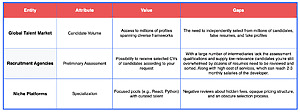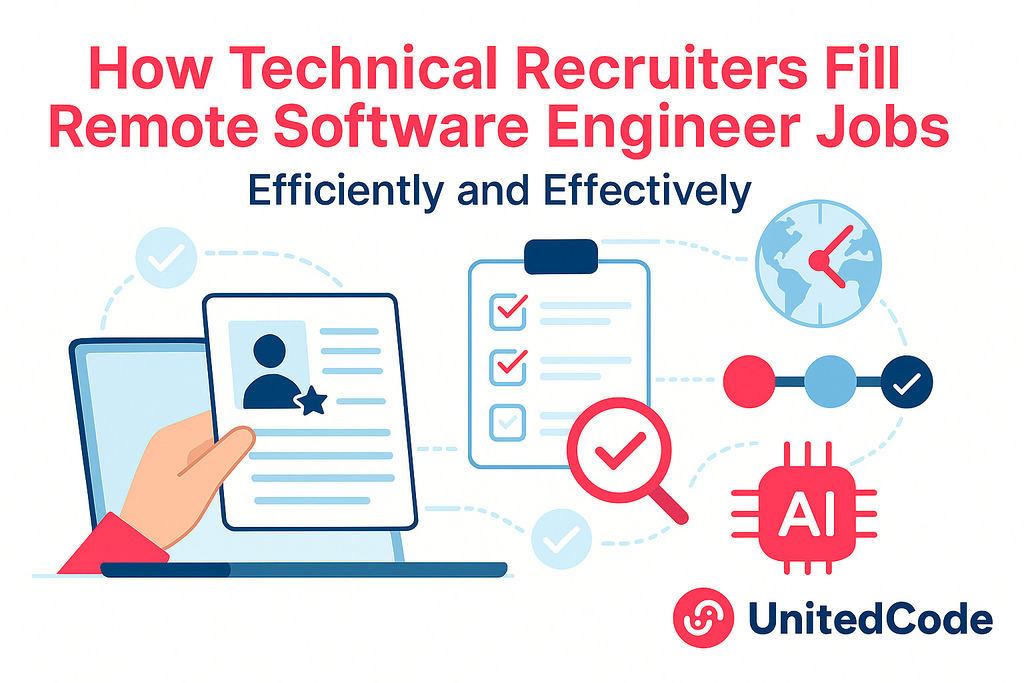Remote development talent is no longer a luxury – it’s a critical driver of innovation for startups racing to launch and enterprises striving to scale. Yet despite the promise of global talent, 74% of technology leaders report delays and inefficiencies when sourcing reliable engineers, often due to fragmented vetting, unclear processes, or mismatched expectations. Choosing the right dedicated developer isn’t just about filling a role – it’s about securing long-term stability, controlling costs, and ensuring cultural and technical fit. This guide lays out a practical, step-by-step playbook that helps companies cut through hiring noise, move from defining project needs to final decisions with confidence, and build distributed teams that actually deliver. It’s a proven path to hiring smarter, faster, and with greater trust. You will learn:
- The eight foundational steps help you to hire dedicated developers
- How a rigorous vetting process delivers quality and trust
- Best practices for onboarding and managing distributed teams
- Strategies to optimize cost and choose the right platforms
- Legal considerations for global remote engagements
By following this blueprint, tech companies can leverage UnitedCode’s elite, pre-vetted talent pool and transparent pricing model as a supporting advantage without disrupting the core hiring process.
What Are the Key Steps for Hiring Trusted Remote Developers?
The remote hiring journey combines structured planning, talent sourcing, rigorous assessment, and decisive selection to guarantee a perfect match.
How to Define Your Remote Developer Hiring Needs
Defining hiring needs means outlining project scope, technical requirements, and cultural fit to streamline candidate evaluation. This clarity prevents scope creep, aligns expectations, and accelerates onboarding.
- Identify project objectives and deliverables.
- Specify the required tech stack, frameworks, and experience level.
- Determine collaboration model (full-time, part-time, contract).
- Outline communication channels and time-zone preferences.
These steps create a clear blueprint, ensuring every subsequent phase aligns with business goals and technical demands.
Where to Hire Dedicated Software Developers?
Sourcing pre-vetted talent combines talent marketplaces, recruitment agencies, and specialized networks to maximize reach and quality. Over the last 5-10 years, numerous popular IT recruitment and staffing platforms have emerged and experienced significant growth. However, they rely on outdated outsourcing and recruiting models just wrapped in modern marketing. Hidden fees, inflated pricing, and unclear vetting often lead to poor hiring decisions, which subsequently result in subpar code, ultimately causing direct financial losses and lost time for their clients. More importantly, they fail to address the new market realities shaped by AI’s rapid adoption, making their approach a dead end in the evolving tech talent landscape.
UnitedCode is solving these problems by providing an innovative, data-driven, AI-powered platform that transforms the tech recruitment landscape. Since 2019, UnitedCode has utilized advanced analytics to assess developers’ skills, career histories, and profiles with unparalleled precision. Combined with our proprietary resume format, expert recruiters, and sourcing in 25 countries, we deliver rigorously vetted talent through a fully transparent, flat-fee model.
Over the past 10-15 years, numerous IT recruiting agencies, outsourcing companies, and popular platforms for selecting IT specialists have emerged. Each source has its own unique advantages and serious disadvantages, which are briefly described in the table below:

As we can see, the disadvantages outweigh the advantages, which indicates that the tech hiring market is at a breaking point. Hidden fees, inflated pricing, and unclear vetting often lead to poor hiring decisions, which subsequently result in subpar code, ultimately causing direct financial losses and lost time for their clients.
UnitedCode disrupted the outdated methods by introducing an open pricing model and a proprietary data-driven approach. Our AI-powered solution goes beyond standard resumes, thoroughly validating, analyzing, and accurately matching candidates to specific project needs.
To find your top-talented dedicated software developer, just submit an application describing your needs, and we will begin a preliminary search immediately. Then, we schedule a call to thoroughly discuss every detail, ensuring we can present you with only highly targeted resumes. No upfront commitments required, you can even use our search simultaneously with other platforms, and only then make a choice of your candidate.
How to Conduct a Rigorous Vetting Process for Remote Developers

Effective vetting ensures that candidates possess both deep technical expertise and reliable collaboration skills, safeguarding project quality.
- Administer coding challenges aligned with real-world tasks.
- Review project samples and open-source contributions.
- Conduct live whiteboard interviews to assess problem-solving.
- Utilize AI-driven screening tools for matching resumes and skills.
This structured approach uncovers both coding mastery and practical experience, minimizing hiring risk and fostering trust.
Gatewood, R. D., & Field, H. S. (1994). Human resource selection. Dryden Press.
This source emphasizes the importance of thorough candidate assessment in the hiring process, aligning with the article’s focus on vetting.
What Are the Best Practices for Interviewing Remote Developers?
Structured remote interviews combine synchronous and asynchronous methods to validate competencies and fit.
- Use video interviews with standardized technical questions and live coding sessions.
- Assign take-home exercises with clear evaluation criteria.
- Evaluate communication skills through collaborative design workshops.
- Include cross-functional stakeholders to assess cultural alignment.
Blending these techniques ensures a comprehensive view of each candidate’s capabilities and teamwork style.
At the same time, it is essential to remember that even the presence of a video link with the candidate and his willingness to demonstrate his documents do not eliminate fraud risks. In our previous article, “Texas Tech Hiring Revolution”, we mentioned key criteria for identifying a fraudster based on our experience with software developers’ assessments. We believe that this information could be helpful to you in your tech candidate hiring practice.
How to Make a Final Hiring Decision for Remote Developers?
Final hiring decisions hinge on a balanced evaluation of skills, cultural fit, and long-term potential to secure retention.
- Score each candidate on technical proficiency, communication, and accountability.
- Compare candidate profiles against the role requirements matrix.
- Gather stakeholder feedback and align on top candidates.
- Extend an offer with transparent terms and a support outline.
This decision framework promotes objective selection and sets the stage for successful long-term collaboration.
How Does the Remote Developer Vetting Process Ensure Trust and Quality?
A well-designed vetting process maps assessment steps to candidate attributes, building confidence in every hire.
What Technical Assessments Are Essential for Vetting Remote Developers?
Technical assessments validate core skills and problem-solving aptitude, driving quality outcomes.
- Coding Tests that mimic daily tasks for realistic evaluation.
- Architecture Design Challenges to assess system-level thinking.
- Debugging Exercises to measure diagnostic skills.
By matching tests to project context, you confirm that developers can deliver robust, maintainable code.
How to Evaluate Soft Skills for Remote Developer Success?
Strong soft skills underpin effective remote collaboration and accountability.
- Assess written communication through project documentation tasks.
- Test problem-solving approach via scenario-based questions.
- Evaluate self-motivation by reviewing past remote project experiences.
Integrating these evaluations uncovers interpersonal strengths essential for distributed teamwork.
Why Are Background and Reference Checks Critical for Remote Hiring?
Background and reference checks verify reliability, security clearance, and professional conduct.
- Confirm employment history and role responsibilities.
- Validate educational credentials and certifications.
- Contact previous managers to assess work ethic and teamwork.
These verifications reduce fraud risk and reinforce organizational trust in remote contributors.
How Does UnitedCode.net’s Vetting Process Differ from Competitors?
UnitedCode combines proprietary AI-driven screening with human-led technical deep dives to deliver unparalleled trust and transparency. Our process includes semantic profiling with AI for skill-context correlation, multi-stage assessments with a coding sandbox and design review, and proactive performance monitoring with retention analytics.

This hybrid methodology ensures every engineer is pre-vetted to match technical needs and cultural priorities, setting a new standard in remote hiring.
Integrating these tools creates a cohesive virtual workspace that accelerates ramp-up and collaboration.
What Is the Cost of Hiring Remote Developers and How to Optimize It?
Understanding direct and indirect costs enables precise budgeting and ROI calculation.
What Are Typical Salary Ranges for Remote Software Developers by Role?
Salary expectations vary by region, experience, and specialization, influencing cost projections. When applying for staffing services to outsourcing firms, IT staff augmentation companies, or recruiting agencies, it is crucial to understand that hidden fees and inflated prices can significantly increase the developer’s final rate. Deloitte’s 2024 Human Capital Trends Report voiced that agency margins typically range from 40% to 60%, often with concealed subcontractor fees common for outsourcing chains.
UnitedCode broke this “hidden fees” approach by introducing an open pricing model with a flat commission, which significantly reduces the final software developer rates offered to our clients. Please find the comparison table with the rates standard for the South America and Europe regions.

Mapping these benchmarks helps you set competitive offers while controlling overall budget.
How Does Transparent Pricing Build Trust with Remote Hiring Services?
Transparent pricing aligns expectations, simplifies budgeting, and fosters partnership. UnitedCode.net offers transparent pricing with an open, flat commission for talent matching, vetting, and support, as well as clear retention and replacement guarantees. Additionally, we provide comprehensive staffing support, onboarding, compliance, and reporting, ensuring that nothing distracts you from the product development process. Clarity in pricing signals credibility, provides predictable costs, strengthens trust, and encourages mutually beneficial collaboration, where engineers feel valued and clients can allocate budgets with confidence.
Hire Dedicated Developers: Proven Tips Recruiters Keep Quiet
Navigating contracts, compliance, and IP protection is essential for secure global engagements.
How to Navigate Remote Work Contracts and Employment Laws
Clear contracts define relationship type and govern legal obligations across jurisdictions.
- Specify contractor vs employee status and associated tax implications.
- Outline payment terms, deliverables, and termination clauses.
- Include confidentiality and non-compete provisions tailored to local laws.
Well-crafted agreements mitigate legal risk and set transparent expectations.
What Are Key Compliance Issues in Global Remote Hiring?
Data security, tax reporting, and labor regulations vary across regions, requiring careful management.
- Implement GDPR or CCPA safeguards for personal data.
- Register appropriate local entities or use employer-of-record services.
- Adhere to minimum wage and mandatory benefits requirements.
Proactive compliance protects your company from fines and reputational damage.
How to Protect Your Company with Clear Remote Developer Agreements
Comprehensive agreements safeguard intellectual property and confidentiality.
- Include work-for-hire clauses assigning IP ownership.
- Define data handling and access protocols in NDAs.
- Establish dispute resolution and jurisdictional terms.
These provisions secure your innovations and ensure smooth collaboration.
UnitedCode’s multiservice solution includes comprehensive business protection, helping you operate confidently with pre-made contract templates and business insurance included. This shields you from financial risks and legal issues, ensuring your projects remain secure.
Conclusions
Building a successful remote development teamhinges on a strategic approach that emphasizes clear requirements, rigorous vetting, and effective onboarding practices. By leveraging UnitedCode’s expertise, companies can access a pool of pre-vetted talent that enhances project quality and accelerates innovation. Embrace these best practices to foster a culture of accountability and collaboration within your distributed teams. Start optimizing your remote hiring strategytoday and unlock the potential of elite developers.
Prepared and written by Yuliia Romanova, Co-Founder and COO of UnitedCode, Certified Scrum Product Owner (CSPO), Certified ScrumMaster I & II (CSM), and female entrepreneur.



